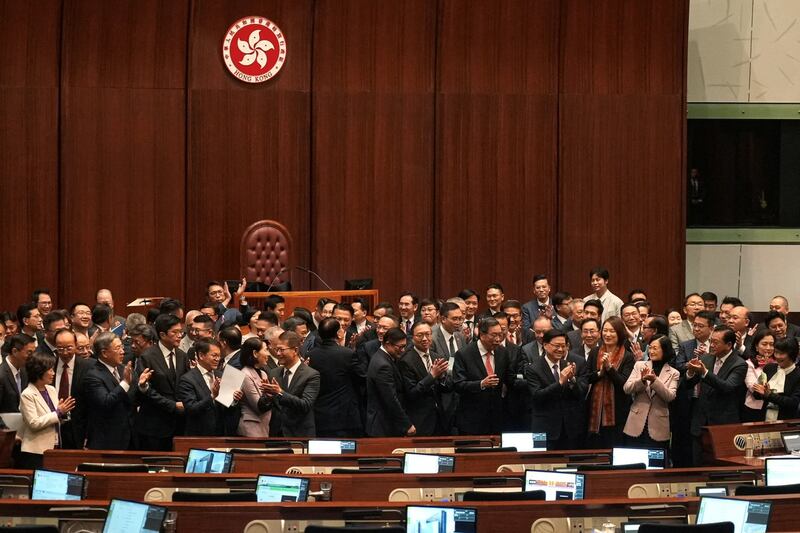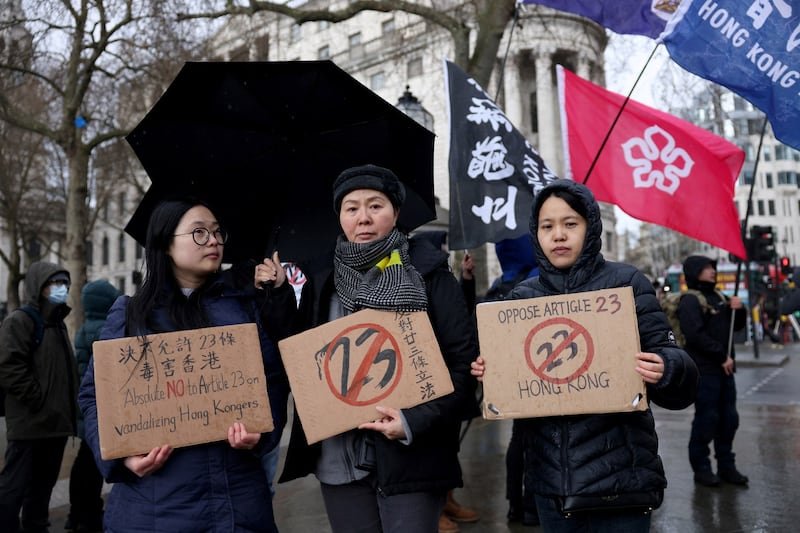Read coverage of this story in Mandarin and Cantonese
Authorities in Hong Kong have jailed three people for wearing a 'seditious' T-shirt and making protest-related graffiti and social media posts, the first imprisonments under the Article 23 security law.
The West Kowloon Magistrate's Court handed down a 14-month jail term to Chu Kai-pong, 27, the first person to be sentenced under the new law, on Sept. 19.
Chu was found guilty of wearing a T-shirt and a mask emblazoned with a banned slogan of the 2019 protest movement, "Free Hong Kong, Revolution now!" and "Five Demands, Not One Less," a reference to the five demands of the protest movement that included calls for fully democratic elections.
The court jailed a second defendant, 29-year-old Chung Man-kit, for 10 months after he pleaded guilty to three charges of sedition. Chung had repeatedly scrawled slogans in support of independence for Hong Kong, as well as the "Free Hong Kong" protest slogan, on the back of bus seats in March and April, the court found.
A day later, the same court handed a 14-month jail term to defendant Au Kin-wai, after finding him guilty of "knowingly publishing publications with seditious intent,” based on posts he made to YouTube, Facebook and X calling on ruling Chinese Communist Party leader Xi Jinping and Hong Kong Chief Executive John Lee to step down.
What is the Article 23 legislation?
The Safeguarding National Security Ordinance was passed on March 23, 2024, fulfilling the Hong Kong government's obligations under Article 23 of the city's constitution, the Basic Law, which gives the law its nickname.
The law covers many of the same offenses as the 2020 National Security Law, but with expanded definitions, new crimes and penalties.
It adds the crime of "treason," "theft of state secrets" and "external interference" to the statute book, while expanding maximum sentences for "sedition" from to 7 years' imprisonment, 10 if the person is found guilty of "collusion with external forces."

Previously, the charge of "sedition" under colonial-era laws carried a maximum penalty of just 3 years in jail.
Suspects can be detained for up to 16 days before being charged, and be prevented from seeing a lawyer in some circumstances.
In May 2024, police arrested six people under the law for making "seditious" Facebook posts mentioning the 1989 Tiananmen massacre, including vigil organizer Chow Hang-tung.
Rights activists have warned that the law gives officials too much power, especially when it comes to defining what is meant by "collusion with foreign forces" or "state secrets," or what constitutes subversion.
It is the second national security law to be passed in the city since 2020, and, like its predecessor, applies to speech and acts committed by anyone, of any nationality, anywhere in the world.
Why the need for a second security law?
The Safeguarding National Security Ordinance, also known as Article 23, has been described by Hong Kong-based former Straits Times reporter Ching Cheong, who served a five-year prison sentence in China for "espionage" for doing his job, as a "sword of Damocles" over Hong Kongers' heads.
According to Ching: "Essentially this law is the culmination of a long-running attempt to graft the ideology, political ideas, and behavioral patterns of the Chinese Communist Party’s totalitarian system onto a pro-Western capitalist society that respects universal values."
While the 2020 National Security Law was an emergency response from Beijing to what it saw as chaos and instability during the 2019 protests, the Article 23 law was always inevitable, dating back as it did to Sino-British negotiations ahead of the 1997 handover, in which the people of Hong Kong had no say or control.
But the process faced mass popular anger and opposition.
The Hong Kong government was supposed to have passed national security legislation decades ago, but officials shelved the bill following a mass protest in 2003 that took leaders by surprise.
What was the point of the first security law?
The Article 23 legislation remained on ice throughout the mass pro-democracy movements of 2014 and 2019.

But when protesters started defacing the emblems of Chinese rule in 2019, both in the Legislative Council and outside Beijing's Central Liaison Office in Hong Kong, Chinese officials started calling for a crackdown on dissent to prevent "hostile foreign forces" from destabilizing Hong Kong.
At 11.00 p.m. local time on June 30, 2020, the National People's Congress Standing Committee imposed the Hong Kong National Security Law on the city by inserting it into one of the annexes of its constitution, bypassing the Legislative Council, or LegCo.
More than 10,000 people have been arrested and at least 2,800 prosecuted in a citywide crackdown in the wake of the 2019 protest movement, mostly under public order charges.
Nearly 300 have been arrested under 2020 National Security Law, according to the online magazine ChinaFile.
Translated by Luisetta Mudie. Edited by Luisetta Mudie and Joshua Lipes.
